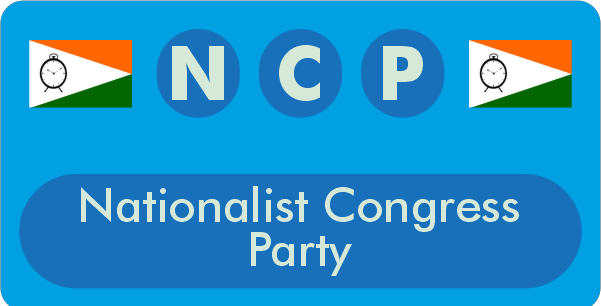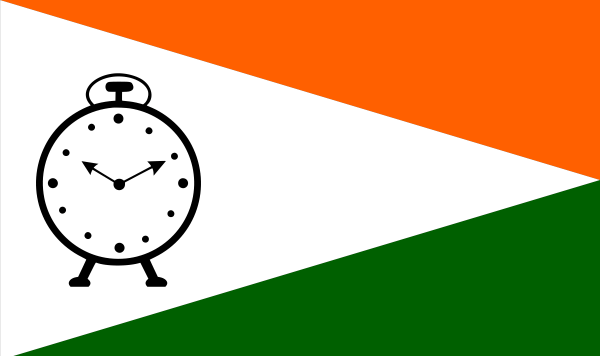What is the Full Form of NCPNCP: Nationalist Congress PartyNCP stands for Nationalist Congress Party. Nationalist Congress Party is a nationalist political organization with a strong presence in Maharashtra. Sharad Pawar, P. A. Sangma, and Tariq Anwar created the party on June 10, 1999, following their expulsion from the INC (Indian National Congress). The ECI has chosen an analog clock with the time 10:10 on it as the NCP's election symbol. The blue-drawn clock features two legs, an alarm button, and two hands. It is placed on an Indian flag with three colors. The address of the Nationalist Congress Party 's official website is https://ncp.org.in/. 
One of India's eight national parties is the Nationalist Congress Party or NCP. The party typically backs Gandhian secularism and Marathi nationalism. NCP is the nationwide political group in India.The National Congress Party (NCP) has referred to itself as a "millennial party with a contemporary and progressive orientation" with its ideologies. A "democratic secular society devoted to equality and social justice" has been advocated. The problem emerged when Sonia Gandhi assumed leadership. Three former members of the Indian National Congress (Congress Party), Sharad Pawar, Purno Sangma, and Tariq Anwar, founded the Nationalist Congress Party formally in June 1999 in New Delhi after they were expelled from the Nationalist Congress Party for wanting to limit who could serve as the president, vice president, or prime minister of the nation to Indian citizens only. In 2004, Joining the United Progressive Alliance (UPA)-led coalition government the NCP (chose Manmohan Singh to be PM) Founder Of the Nationalist Congress PartySharad Pawar, in full Sharad Chandra Govind Rao Pawar, Sharad Chandra has sometimes written Sharad Chandra (born December 12, 1940, Baramati, India), Indian politician and government officer is the founder of the party. In 1999 Pawar helped in forming the NCP and acted as its president. Pawar was one of 10 children born to a middle-class farming family in Baramati, southeast of Pune, in Maharashtra state. He attended college in Pune, where he graduated with a commerce bachelor's degree. While there, he got involved in student politics. Pawar joined the Indian National Congress's (Congress Party) youth wing and was elected president in 1964. In 1967, Pawar won a seat in the Maharashtra assembly under the mentorship of elder politician Yashwantrao Chavan. He ran from the Baramati seat in his first of several elections. He was re-elected to the assembly in 1972, and throughout the next years, he held several cabinet positions in the state government. Performance of the Nationalist Congress PartySharad Pawar, P. A. Sangma, and Tariq Anwar associated in forming the NCP on June 10, 1999, after being ousted from the Indian National Congress (INC) on May 20, 1999, for questioning Sonia Gandhi's legitimacy to serve as party leader. The Indian Congress (Socialist) party joined with the NCP at its creation. 
Despite being created to oppose Sonia Gandhi's presidency, the NCP joined the Congress-led UPA in October 1999 to form the Maharashtra government. The party merged with the UPA in 2004 to become the Manmohan Singh-led Indian government. Sharad Pawar, the head of the NCP, served as agriculture minister during both five-year periods of the Singh-led administration. Until 2014, the party remained as a member of the Maharashtra state government, governed by Congress, to run for president. The UPA was defeated by the opposing NDA alliance, led by Narendra Modi, in the May 2014 Lok Sabha, and they forced the NCP to leave the office for the first time in 10 years. Before the 2014 Maharashtra Legislative Assembly elections, the NCP chose to compete independently, breaking its partnership with the Congress party. The BJP won the most votes in the assembly election and created an early minority administration with the help of Nationalist Congress Party. After voting for the 48 Maharashtra-based Lok Sabha seats took place in April 2019, Congress and NCP had an agreement to share seats. The BJP and Shiv Sena won twenty three and eighteen seats out of the state's 48 Lok Sabha seats, giving the NDA a resounding victory in the election. The NCP won five seats from its stronghold in western Maharashtra, while the Congress party won just one seat in the state. After a month of political upheaval in November 2019, the NCP regained control of the state as a member of the alliance created by the Shiv Sena, the Congress, and the Nationalist Congress Party. This came after the Vidhan Sabha elections in October 2019, where the seat-sharing agreements between the BJP-Shiv Sena and the NCP-Congress remained unbroken. Although the BJP and Shiv Sena jointly won the majority of seats in the legislature, disagreements among the two parties prevented them from forming a government. The BJP rejected establishing a minority administration since it fell well short of the 145 seats needed to win a majority with its 105 seats. Shiv Sena negotiated with the NCP and Congress simultaneously to form a government. However, on November 23, 2019, the BJP established a government with backing from the Nationalist Congress Party, led by Ajit Pawar, in a spectacular and divisive move. Becoming the deputy Chief minister. Three days later, this administration was toppled by the resignations of Ajit Pawar and Chief Minister Devendra Fadnavis. The Maharashtra governor swore in Uddhav Thackeray, leader in Shiv Sena, as the state's next chief minister on November 28, 2019. Shiv Sena, NCP, INC, and several independent legislators are all part of Thackeray's ruling alliance. Ministers from the NCP hold key portfolios in the government. However, this partnership was overthrown in June 2022 when a breakaway group headed by Shiv Sena leader Eknath Shinde won the backing of two-thirds of the party's legislators. The BJP reinstated the old Sena-BJP collaboration.Sharad Pawar, the president of the NCP, then liquidated all of the party's departments and cells on July 20. The Bombay Nawab Malik, the president of the Nationalist Congress Party, stated that the NCP supports merging of India, Pakistan, and Bangladesh. Malik compared it to the unification of Germany by saying 'If they can tear down the Berlin Wall, why can't India, Pakistan, and Bangladesh unite?' Party logo Of Nationalist Congress PartyThe analog alarm clock is the Nationalist Congress Party 's electoral emblem. 
The blue-drawn clock features two legs, an alarm button, and two hands. It is placed on an Indian flag with three colors. Party management Of Nationalist Congress PartyIndian politics also turned dynastic during the 1980s, probably due to the lack of a party structure, independent civil society organizations that could rally support for the party, and coordinated electoral finance. From the national level to the district level, this phenomenon is evident. In that sense, NCP is regarded as the political party in India with the highest degree of dynasticism. The leadership of the party is mostly based in the state of Maharashtra. Numerous Sharad Pawar's family members, including his daughter Supriya Sule and nephew Ajit Pawar, occupy influential roles in the party. When it won 71 out of the 124 seats it ran for the 2004 assembly elections, the NCP's political clout in Maharashtra hit a new peak (compared with the 69 seats won by Congress). However, the NCP's total fell to 62 out of the 114 seats up for election in the 2009 state elections, while Congress recovered and won 82 seats. The two parties still held enough seats to maintain their coalition administration. The Nationalist Congress Party performed far worse nationally and in states other than Maharashtra. 2007 saw elections for the state legislative assembly of Goa. Nationalist Congress Party gained three seats in the state's two thousand and twelve's assembly elections whereas none of the seats further. At the federal level, the party won nine seats in the 2004 and 2009 elections and eight in the Lok Sabha (the lower house of the Indian parliament) in 1999. However, the Nationalist Congress Party only garnered a little share of the popular vote countrywide (1.8 percent in 2004, which increased slightly to roughly 2 percent in 2009), and 45 of the party's 46 candidates for seats in states other than Maharashtra were unsuccessful in their bids in 2009. From four in the 2006 election to seven in the 2010 and 2012 elections, the party gradually grew its representation in the Rajya Sabha (upper chamber of parliament). Still, they defeated it in the 2014 Lok Sabha elections, which reduced its representation to six seats. Defections from the party's ranks contributed to some of the NCP's overall relative weakness. In Kerala, one section left the party in 2002 (although another party united with the NCP in 2006), while in Chhattisgarh, another segment left the party in 2004. The founder Purno Sangma's actions, in which he expelled his Meghalaya-based section from the Nationalist Congress Party in 2004, were the most detrimental. He eventually rejoined the party in 2012, after Pawar endorsed Pranab Mukherjee, the UPA candidate. He again quit the NCP to run for president of India. Defeated by Mukherjee, Sangma founded the National People's Party in early 2013 with a sizable victory.
Next TopicFull Form
|
 For Videos Join Our Youtube Channel: Join Now
For Videos Join Our Youtube Channel: Join Now
Feedback
- Send your Feedback to [email protected]
Help Others, Please Share










